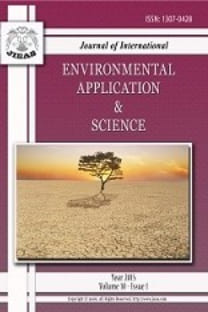Evaluation of the Irrigation Waters of Çaycuma District in Terms of Certain Water Parameters
Irrigation water, Çaycuma, water quality
___
1. Anonim (2019) Çaycuma’nın tanıtımı. http://www.caycuma.gov.tr/caycumanin-tanitimi. Erişim tarihi: 15.01.2019.2. Arslan H, GülerM, Cemek B, DemirY,(2007) Bafra Ovası Yeraltı suyu Kalitesinin Sulama Açısından Değerlendirilmesi. Tekirdağ Ziraat Fakültesi Dergisi, 4(2).3. AyyıldızM,(1990) Sulama Suyu Kalitesi ve Tuzluluk Problemleri. Ank. Üniv. Zir. Fak. Yay. No: 1196, Ders Kit. No: 344, Ankara.4. Aşur F, (2017)Van Kenti Yakın Çevresi Kıyı Alanı Örneğinde Sulak Alanlar ve Görsel Peyzaj Kalite Değerlendirmesi, TürkTarım ve Doğa Bilimleri Dergisi, 4(4), 506-515.5. BrownPH, Bellaloui N, Wimmer MA, Bassil ES, Ruiz J, HuH, Pfeffer H, Dannel F, Romheld V, (2002) “Boron in plant biology”, Plant Biol., 4, 205-223.6. Gülgün B, Yazici, Karaman K., Öztürk S, (2013) Escalating Water Problems in The World an in Turkey and Legal, Social and Tecnical Measures. J.Int. Environnemental Application & Science, 8 (2), 280-287.7. Gülgün B, Güney MA, Aktaş E, Yazici, K, (2014) Role of Landscape Architect in Interdıscıplinary Planing of Sustainable Cities. Journal of Environmental Protection and Ecology 15, No 4, 1877–1880 (2014).8. Gülgün B, Köse M, Yazici K, Dursun Ş, Ankaya F and Köse H(2015) Soil Polutions in the Environment Created by Developing Technology and Biological Measures in Soil pollution. 5th Internatonal Conference of Ecosystems Vol.1, 558-562, Tiran, Albania.9. Hilal N, KimGJ, Somerfield C, (2011) “Boron removal from saline water: A comprehensive review”, Desalanition, 273 (1), 23-25.10. Howell TASR, EvettandJA Tolk, (2001) Irrigation system and Management to Meet Future.11. KıymazıS, Karadavut U, Ertek A,(2016) Seyfe Gölü Havzası Yeraltı Suyu Kalitesinin Zamana Göre Değişiminin İncelenmesi. Uludağ Üniversitesi Ziraat Fakültesi Dergisi, Cilt 30, Sayı 1, 21-31. 12. Parks JL, EdwardsM, (2005) “Boron in the environment”, Critical Reviews in Environmental Science and Technology, 35 (2), 81-114.Rhoades JD,(1972) Quality of water for irrigation. Soil Sci., 113:227-284.13. Sancak S, Karagöz S,Aşur F and Boynukara Z, (2017) Türkiye’de Çevreyi Korumaya Yönelik Bilinçlenmeninönemi” presented at the Uluslararası Türk Dünyası Fen ve MÜHENDİSLİK kONGRESİ, Antalya, ISBN:978-975-93505-7-414. Şimşek G, Çanlı M, Karadavut U, Yazıcı EM, Soğancı K, (2017) Sulama Yapılan Alanların Bazı Su Parametreleri Açısından Ayırma (Discriminant) Analizi Kullanılarak İncelenmesi. Türk Tarım ve Doğa Bilimleri Dergisi. 4(3): 339-346. 15. Wei, Y., Zheng, Y., Chen, J.P., 2001.“Design and fabrication of an innovative and environmental friendly adsorbent for boron removal”, Water Research, 45, 2297-2305.16. WWAP (World Water Assessment Programme). (2012) The United Nations World Water Development Report 4: Managing Water Under Uncertainty and Risk. Paris, UNESCO.17. Yazici K, Gülgün B and Yenil N, (2013) Using of Alternative Plants in Changing Environment with Global Warming. International 3th Internatonal Conference of Ecosystems 2013, Vol 2. 672-677, Tiran, Albania.18. Yazici K, Gülgün Aslan B, (2018) GIS Usıng Multı-Crıterıa Decısıon Analysıs Forassessment and Map-Based Indıcators for Nurserygarden Management. IJEES, 8(2), 415-428.19. Yeter T, Yurtseven E,(2015). Sulama Suyu Tuzluluğu ve Yıkama Gereksinimi Oranlarının Yoncada Çimlenme ve Gelişmeye Etkisi. Toprak Su Dergisi, (1): (36-42).20. Yudelman M,(1994) Feeding the World. Int. Irrig. Manage, Institute Rey. 8(1): 4-15. R.K.- ISSN: 1307-0428
- Yayın Aralığı: Yılda 4 Sayı
- Başlangıç: 2006
- Yayıncı: Selçuk Üniversitesi
The Effect of the Addition of Biodiesel in the Fossil Diesel to Its Characterizing Parameters
Florent DOBROSHİ, Mazrreku ARMELA, Malollari ILİRJAN, Lorina LİÇİ
Determination of Heavy Metals in the Lumbardhi River, Prizren - Kosovo
Sami GASHİ, Valon DURGUTİ, Fisnik LAHA, Fidan FEKA
A Research On Awareness of Zoos: Landscape Architecture Students
Evaluation of the Irrigation Waters of Çaycuma District in Terms of Certain Water Parameters
Şüheda Basire AKÇA, Sinem ÇOLAK, Nazmiye MARIM
Adnan AKÇİN, Tülay AYTAŞ AKÇİN
Physical-chemical profile of drinking water in some villages of Zvecan, Kosovo
Florent DOBROSHI, İlirjan MALOLLARI, Petrit KOTORI, Blerim BARUTI
